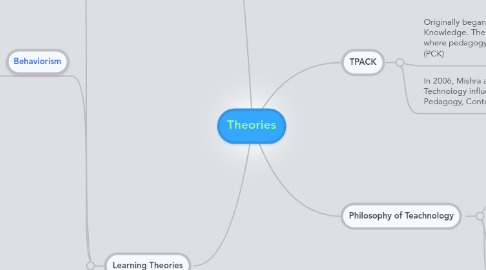
1. Learning and Technology
1.1. Media Ecology
1.1.1. "the medium is the message". The mode through which we communicate is in many ways, as important as what is being communicated
1.1.2. Medium of communication can affect perception, understanding, feeling or value
1.1.3. Media environments dictate the structure of our interaction with others and our environment and can be overt or subtle.
1.1.3.1. Teachers need to give careful consideration to the construction of VLE's and MOOCS particularly if they wish for them to be open ended
1.2. Technological determinism
1.2.1. Technology is created to fill in necessary gaps
1.3. Social Construction of Technology (SCOT)
1.3.1. human action shapes technology
1.3.1.1. Students can participate in creating technology that suits their needs
1.3.1.2. Social circumstances shape success of emerging technology
2. Learning Theories
2.1. Connectivism
2.1.1. Learning is the process of creating connections or identifying relationships between knowledge aquired through experience
2.1.1.1. Teaching students to understand relationships among ideas, concepts and groups is an important skill
2.1.2. Learning is more importantl than knowing
2.1.3. Learning and knowledge can reside in non-human appliances
2.2. Behaviorism
2.2.1. Behaviours can be measured and trained
2.2.1.1. Use of assessments for observable behaviour
2.2.2. Behaviours can be conditioned by adjusting environmental stimulus
2.2.2.1. Modeling
2.2.2.1.1. demonstrations
2.2.2.2. Repetition
2.2.2.2.1. drill practice
2.2.2.3. Use of reward and punishment
2.2.2.3.1. token system
2.2.2.4. Behaviourist approach found useful for intervention of undesirable behaviours in students
2.2.2.4.1. behaviour modification plans
2.2.3. All behaviour can be broken down into fundamental processes
2.2.3.1. Reductionist approach lends well to lesson planning
2.2.3.2. Systematic approach to defining steps involved in carrying out task allows focus on challenge areas
2.2.3.3. Organizer tools can be used to refine processes for struggling students
2.3. Cognitivism
2.3.1. The way people think impacts their behaviour
2.3.1.1. Structuring and organizing information assists learners in problem solving
2.3.2. People acquire knowledge and skills through mental and cognitive processes
2.3.2.1. Students actively participate in learning process
2.3.3. Sensory, long-term and working memory are key components required for learning
2.3.3.1. For students to learn they must be able to remember, retrieve, and store information in their memory
2.4. Constructivism
2.4.1. Learning occurs through actively interacting with ones environment\
2.4.2. Individuals are unique, their social, cultural and previous experiences shape their perspective and new information needs to be assimilated or accommodated in order for learning to occur
2.4.2.1. Teaching should be built upon the learners unique current understandings and perspective.
2.4.3. Meaningful learning occurs when individuals are presented with a complex problem or information and learn skills needed to solve the problem or better integrate new information
2.4.3.1. Students should be presented with authentic, problem based tasks and context to learn from
2.4.3.2. Discovery and exploration through interactions with others and their environment should be present through learning experiences.
2.4.3.3. Teachers do not simply lecture but facilitate students to discover and learn by setting up authentic learning experiences and asking guided discovery questions.
3. TPACK
3.1. Originally began with PCK: Pedagogical Content Knowledge. The best teaching and learning occurs where pedagogy, and content knowledge intersect (PCK)
3.1.1. Pedagogy: How children are taught
3.1.2. Content: What is being Taught
3.2. In 2006, Mishra and Khoeler proposed Technology influenced learning in equal part to Pedagogy, Content Knowledge (TPACK)
3.2.1. This ties in closely with technology theories such as SCOT that suggest technology influences learning
4. Philosophy of Teachnology
4.1. A Philosophy of Teaching that reflects personal philosophy of teaching as it pertains to technology in teaching and learning
4.1.1. Teachers can use technology to support own learning and professional development through the effective use of PLN's
